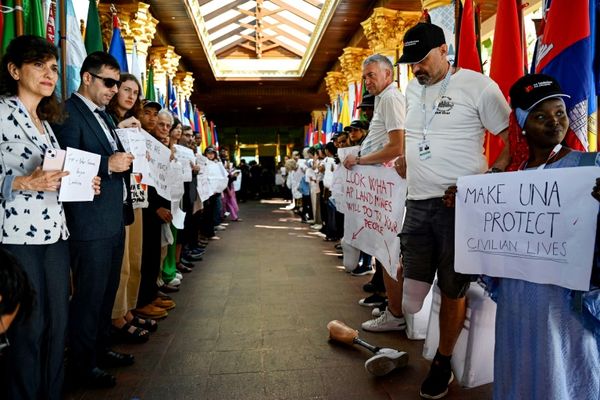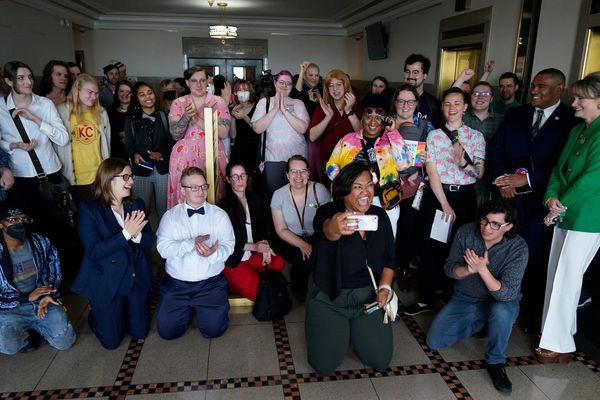WASHINGTON _ President Donald Trump and Vice President Mike Pence are visiting North Carolina on Wednesday _ the kickoff to what could be a nonstop parade of presidential candidates and their surrogates making their way to the Tar Heel State before the 2020 primaries and general election.
Trump rallied supporters at a Keep America Great event at East Carolina University in Greenville, and Pence will join him after spending the day at Fort Bragg. Sen. Thom Tillis, Rep. Mark Meadows and two Republican nominees in special elections for the U.S. House _ state Sen. Dan Bishop (9th district) and state Rep. Greg Murphy (3rd district) _ are among the local politicians expected to attend. Meanwhile, Education Secretary Betsy DeVos will be in Raleigh on Wednesday.
The big-name event is one indication of how important the state _ and its 15 electoral votes _ are to Trump's reelection bid.
"The path to maintaining a majority in the Senate goes through North Carolina and I think the path to the president's reelect does as well," said Tillis, who is up for reelection in 2020 and is part of the Republicans' current 53-seat majority in the Senate.
It will be Trump's sixth visit to the state as president and his first 2020 campaign event in the state. He defeated Democratic nominee Hillary Clinton in North Carolina by 173,315 votes in 2016, earning 49.8% of the vote to Clinton's 46.1%.
Although the margin was slim, it was the largest margin of victory in a presidential vote in North Carolina since George W. Bush's win in 2004. In 2012, Mitt Romney carried the state by 92,003 votes over Barack Obama. In 2008, Obama defeated John McCain by 12,177 votes.
Those close elections have cemented North Carolina as a vital swing state, though its importance may be waning as several Midwestern states have become vital to Trump.
"It's still very important," said Meadows, one of Trump's closest allies in Congress and someone who speaks frequently with the president. "He'll be there a number of times in North Carolina, just like he was in 2015 and '16. I can assure you, based on my conversations with him even in the last week or so, it's a top-tier priority."
Trump made 23 stops in North Carolina in the final 100 days of the campaign, according to NBC News, and Clinton made 16 stops in the state during that time. In the final month of the race, Trump spent six days in North Carolina, while Clinton spent four, according to ABC News. Clinton held her final rally of the campaign in Raleigh.
The Republican National Convention will be held in Charlotte in August 2020.
But Trump's Electoral College victory _ Clinton won the popular vote _ was fueled by narrow wins in Pennsylvania, Michigan and Wisconsin, pushing those states ahead of North Carolina for Democrats looking to win back the presidency. Flipping those three states and keeping all other states the same as in 2016 would result in a Democratic victory.
Obama won the 2012 election without winning North Carolina. He carried Pennsylvania, Michigan and Wisconsin.
"The 2020 Democratic nominee will be under pressure to make those states blue again," said Kaye Usry, assistant professor of political science and policy studies at Elon. "However, I expect North Carolina will still be a key state in the general election campaign. It is within reach for the Democratic nominee."
An Elon Poll released in early March found a generic Democratic candidate leading Trump 48% to 36.4%.
Priorities USA, a Democratic super PAC, put North Carolina in its second-tier of 2020 states _ behind the three key Midwestern states as well as Florida, New Hampshire and Nevada. North Carolina is in the group's Democratic expansion tier with Arizona and Georgia.
First, the Democrats must choose a nominee. North Carolina's primary is on March 3, on what's known as Super Tuesday, exactly one month after the first-in-the-nation Iowa caucuses. Democrats in 14 states will hold their primary or caucus on March 3, including delegate-rich California (416 delegates) and Texas (228). North Carolina's 110 delegates are the third-most up for grabs that day.
"If a clear front runner has not emerged by the time of North Carolina's primary, candidates will have more of an incentive to campaign here and seek votes," Usry said.
"If the race is still a competitive one between two or three remaining candidates at the time of the election, North Carolina could play a decisive role in determining the outcome."
Individuals from North Carolina have contributed $1.6 million to Trump's reelection bid, which ranks sixth among all states. The figure includes contributions directly to the campaign and to the campaign through his joint fundraising committee. It includes only itemized donations.
Trump lost North Carolina's largest counties in 2016, including Wake, Mecklenburg, Durham, Orange, Forsyth, Guilford and Pitt, the site of Wednesday's rally. But he won 76 of the 100 counties overall. He plans to try to drive up the vote among his supporters throughout the state, Meadows said.
"He has great support across the state," Meadows said, pointing to parts of the state outside of its main population centers. "It's mainly about taking the message of what he's promised and how he's produced and how he's fulfilled those promises. I fully expect to see him multiple times in North Carolina."
Wednesday's event was originally scheduled for the same day that special counsel Robert Mueller, who probed Russian interference in the 2016 election, was set to testify before a House committee. Mueller's testimony has been delayed a week.
Trump comes to North Carolina in the middle of a new controversy over his tweets and comments about four Democratic congresswomen of color. Trump has launched a multi-day attack on the four outspoken, liberal freshman congresswomen, who held their own news conference Monday night to answer his calls for them to "go back" to the original countries "whose governments are a complete and total catastrophe."
Three of the four congresswomen _ Alexandria Ocasio-Cortez of New York, Ayanna Pressley of Massachusetts and Rashida Tlaib of Michigan _ were born in the United States. The fourth, Rep. Ilhan Omar of Minnesota, was a refugee from Somalia who was granted asylum in the United States as a child and became a citizen as a teen.
"Just when you think he can't go any lower, he does it. What is he saying? He seems to be saying these aren't really full-fledged Americans. He's saying they came from somewhere else or they need to go back to where they came from," Democratic Rep. David Price, of Chapel Hill, said Monday. "It is racist and it's demeaning."
The Democratic-controlled House passed a resolution of condemnation against Trump for his racist tweets about the congresswomen. Four Republicans and the body's lone independent voted yes with all Democrats. All Republican members of the North Carolina delegation voted no.
Tillis said the 2020 focus should be on the president's economic record.
"If the president, if we, continue to focus on the results that are indisputable in terms of economic growth, low unemployment, if we stay focused on that, then it's going to bode well in North Carolina," Tillis told The News & Observer on Tuesday.
Asked if Trump could avoid talking about the "go back" controversy during the rally, Tillis said slyly, as the doors of his elevator closed: "I don't know what you're talking about."






